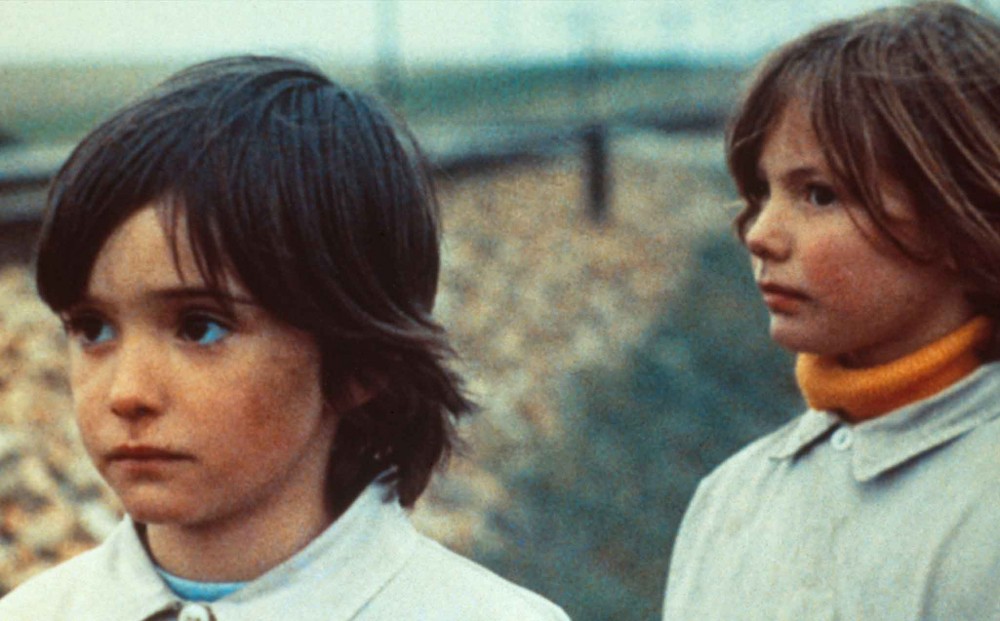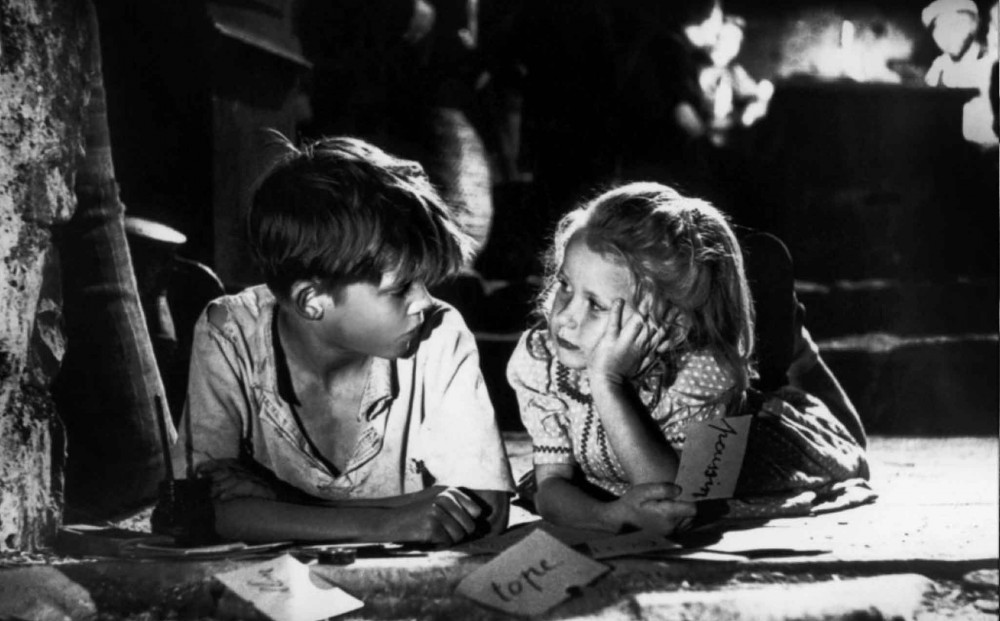FORBIDDEN GAMES & SPIRIT OF THE BEEHIVE
Monday, August 21
FORBIDDEN GAMES
12:30 4:15 8:00
SPIRIT OF THE BEEHIVE
2:20 6:05 9:50
FORBIDDEN GAMES
Directed by René Clément
Starring Brigitte Fossey
(1952) “Michel! Michel! Michel!” France 1940, and as a refugee column trudges along a country road, a dog makes a break for it, with its tiny blonde mistress in pursuit — and then the German fighters strike. But if 5-year-old Brigitte Fossey’s understanding of death is limited as she strokes her mother’s cold face, at least she can bury the dog discarded by her peasant rescuers, aided by 11-year-old farm boy Georges Poujouly. And as they build a special, secret friendship, their pet cemetery in the midst of death steadily grows, topped by crosses stolen from graveyards, even as the adults play their own games of buffoonish, grotesque peasant feuds... And then Fossey (“in a performance that rips the heart out” – The New York Times) shouts his name again. Adapted by the legendary team of Jean Aurenche and Pierre Bost from François Boyer’s successful-in-America novel, with a haunting hit score played by guitar virtuoso Narciso Yepes, the ultimately beautiful, hilarious and disturbing Games initially did so-so box office and screened only on the fringes of the Cannes Festival, then nearly got shut out of Venice — where it promptly won its top prize, the Golden Lion — and then became a worldwide art house smash and Clément’s second Best Foreign Film Oscar winner (following the previous year’s The Walls of Malapaga). DCP. Approx. 87 min.
12:30, 4:15, 8:00
“SUBLIME! A JEWEL! CLÉMENT’S MASTERPIECE! The exemplar of expressive narrative filmmaking.”
– Alan Scherstuhl, Village Voice
“It does not compromise on two things: the horror of war and the innocence of childhood… It is never a tear-jerker: it doesn’t try to create emotions, but to observe them. That’s why it’s so powerful.”
– Roger Ebert
“Boldly weaves the cruel, humorous, and unfathomable…. Clément conjures innocence as few ever have… Fossey’s Paulette belongs among the great child roles, kin to Jean-Pierre Léaud’s Antoine Doinel and Tatum O’Neal’s Addie Loggins.”
– Jeremy Polacek, The L Magazine
“EXTRAORDINARY, POWERFUL AND POETIC! CLÉMÉNT’S MASTERPIECE!”
– James Reid Paris, The Great French Films
“SURELY THE MOST EXTRAORDINARY BLEND OF TRAGEDY AND FEROCIOUS COMEDY IN FILM HISTORY!”
– Vernon Young
“The performances of Poujouly and the infinitely expressive Fossey are among the finest ever given by children.”
– Philip French, The Guardian
“Clémént’s beautiful, lacerating film on the themes of innocence, Christianity, war, and death… [His] method of presentation [is] a series of harsh contrasts, with on the one side the intuitive, lyric understanding between the two children, and on the other the ludicrous comedy of the quarrelsome, ignorant peasant adults.”
– Pauline Kael
“Clémént’s notorious eclecticism can surely never have been so marked within a single film as in this all-purpose allegory, anti-war tract and noirish morality… World War II, holocaust, and petty family feuds form a perverse backdrop to their ‘innocence’ - or perhaps, a mirror to the ‘perversion” of their forbidden games.”
– Paul Taylor, Time Out (London)
“So subtle and thoughtful is Clémént’s direction, and so insightful is the script, we don’t miss a single telling point… Fossey’s is quite simple one of the most uncanny pieces of acting ever attempted by a youngster… The war may be raging only a mile away, yet these peasants seem untouched by it - far more dedicated as they are to their own petty bickering… Only the children in their funeral games seem to be striving for some sense of true spiritual peace.”
– David Ehrenstein
SPIRIT OF THE BEEHIVE
Directed by Victor Erice
Starring Ana Torrent
(1973) In a tiny village on the desolate Castilian plain in 1940, young sisters Isabel Tellería and Ana Torrent eagerly carry their own chairs into the town hall for the visiting cinema truck’s screening of Frankenstein – the original Karloff version dubbed into Spanish – with the elder Isabel explaining to the rapt six-year-old Ana that the Monster is really a spirit who dons his boy like it was a suit of clothes. Later they learn about anatomy in school from “Don José,” a vaguely creepy stick-on-the-organ mannequin; put their ears to the tracks to hear distant trains; explore a remote, mysterious barn; and learn from Dad to discriminate between good and deadly mushrooms. But as Mom continually cycles off to the railroad station to post emotional missives to a person unknown – and feigns sleep when much-older Dad comes to bed – and as Dad falls asleep at his desk writing up accounts of the bees he keeps and the crystal artificial hive he’s invented, Ana gets her first experiences of death, first directly but fake, then indirectly but real, and in a way conjures up her own monster/spirit. Victor Erice’s acclaimed first film was a real labor of love (but then again, with only two successors in the next three decades, they all are), simultaneously a sensitive evocation of the poignancy of childhood (notably via the phenomenal Torrent, possessed of one of the most striking pairs of eyes in cinema history) and, by implication, an elegy for the legacy of the Civil War (unmentioned, but only a year in the past from the film’s events). Haunting, elliptical and poetic, Beehive was selected in a Time Out (London) poll of directors, actors, programmers, and critics as one of the 20th century’s 100 greatest films. 35mm. Approx. 95 min.
2:20, 6:05, 9:50
“Arguably the finest and most beautifully wrought first film of the European ‘70s, a mysterious crucible as elusive, concrete, and visually primal as anything by Herzog, Straub, Olmi, or Denis.”
– The Village Voice
“The story that emerges from [Erice’s] lovely, lovingly considered images is at once lucid and enigmatic, poised between adult longing and childlike eagerness, sorrowful knowledge and startled innocence.”
– A.O. Scott, The New York Times


